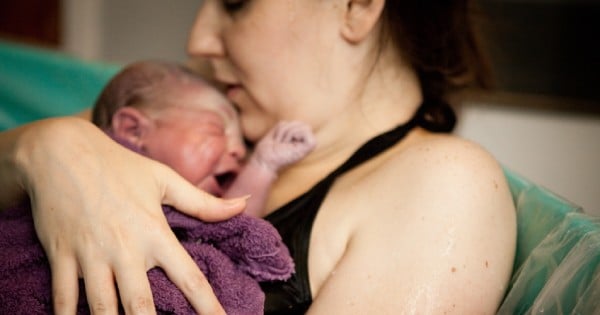
You hear plenty of homebirth horror stories.
At Mamamia we’ve reported a number of them ourselves; the tragic and preventable death of Caroline Lovell, the twin baby boy who died during a homebirth in Adelaide, Jessa Duggar was rushed to hospital because of post-birth complications, and Ruth Irorio’s near-death experience.
The stories are tragic and newsworthy, so it’s right that they should be reported. But stories about successful homebirth experiences are few and far between.
That’s fair enough. After all, who would read a story headlined: ‘Woman gives birth to baby and everyone was delighted.’ It’s almost as un-newsworthy as ‘Dog bites man’.
But the unintended consequences of all that reporting of horror homebirth stories is that you might get the impression that giving birth is a neglectful, selfish thing to do.
It’s not.
That’s not to say homebirth is for everyone. It’s not that either.
But where a mother chooses it, and her caregivers can support it, homebirth is a rewarding, safe, comforting and empowering experience, and it’s one that needs to be better supported in the Australian health system.
Almost five years ago, Sydney writer Jenn Davis, who blogs as Penny Poppleton, gave birth to her daughter, Piper at home.
“We chose to have homebirths for a few reasons. One, I have anxiety around hospitals, doctors, and health care. It’s profound enough I feared that my births would stall or be miserable, so we weighed the risks and as my pregnancy was very low-risk and I was healthy, we opted for midwife-assisted delivery at home.


Top Comments
I think you can have the best of both worlds now as many hospitals allow you to bring in comforts and what you want from home. I had my own blankets and pillows, oil burner and oils, music, stress balls, photos etc... I was able to use the bath and shower in labour, walk around the delivery room nude, use the fit ball. All this plus the best medical care right there. Wonderful midwives and an obstetrician who saved my life due to immediate post birth complications. Yes, things still go wrong in hospital but had I not been there and had been having a home birth I would have died, no question. Hospital for me.
Was it public or private? Just curious.
Home births are like a race car driver not wearing a seatbelt, if everything goes well there's no problem... But if it doesn't somebody gets brain damage or dead, just buckle up people, a hospital birth really is giving yourselves the best chance of a happily ever after.
Very poor analogy. Birth actually works surprisingly well, considering there are 7.5 billion people on the planet and most of them are born out of hospital, to poor undernourished women without any midwifery care. However, birth is not, and will never be, 100% safe - whether in hospital or at home. All we can hope to do is reduce the risk as much as we can - and for some women, the risk is greater in hospital than at home. Women's perceptions of safety in their birth experience count a lot. If a woman has had a previous disaster birth in hospital where her rights were violated, she's not really going to want to repeat the experience.